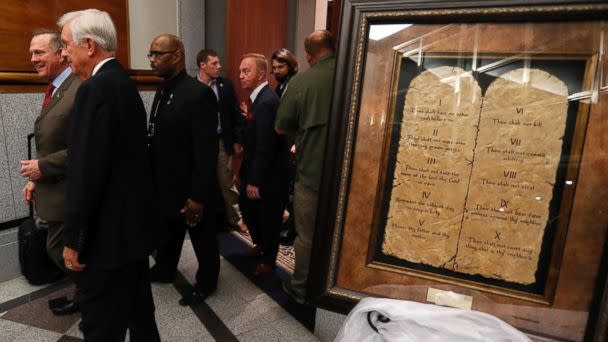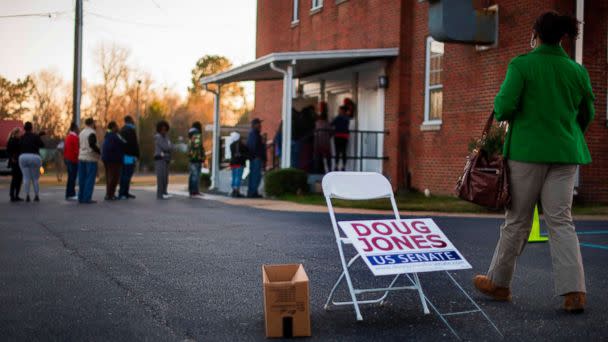This article is more than
7 year oldMajority of Ala. voters say Moore allegations were minor or no factor, exit polls indicate
-- The outcome of the Alabama special election was far from clear as polls closed at 8 p.m. ET.
-- Fifty percent of voters said the allegations against Moore were definitely or probably true, while somewhat fewer, 44 percent, saw them as definitely or probably false, preliminary exit polls results suggest.
-- A majority of voters, 54 percent, said the allegations were a minor factor or not a factor at all.
-- Trump managed only a 47-48 percent approval-disapproval rating in typically Republican Alabama. Those who “strongly” disapprove of the president’s work in office, moreover, outnumbered strong approvers by 8 points, 40 percent to 32 percent.
Read the full story below:
The sexual misconduct allegations against Republican Roy Moore made for a remarkably competitive special Senate election for now-Attorney General Jeff Sessions' seat in deep-red Alabama, with broad gender and racial gaps, and vast shifts among typically pro-GOP groups in the state, including independents, moderates and non-evangelical whites.
The outcome was far from clear as polls closed at 8 p.m. On the central issue of the election, 50 percent of voters said the allegations against Moore were definitely or probably true, while somewhat fewer, 44 percent, saw them as definitely or probably false, according to preliminary exit poll results.
That said, fewer than half, 41 percent, said these allegations were at least one of several important factors in their vote. A majority, 54 percent, said they were a minor factor or not a factor at all. Strikingly, as well, 57 percent said they made their choice before November; that is, before the allegations against Moore surfaced. Moore has denied all allegations.

Among key groups, Democrat Doug Jones led Moore by 15 percentage points among women in preliminary exit poll results, 57-42 percent. By contrast, women voted Republican by 12 points in the 2012 presidential election and by 21 points in the 2008 Senate election in the state, the last two races in which exit polls were conducted. Jones’ support from women was concentrated, in particular, among women with children under 18 at home, who backed him by 67-32 percent. The Moore controversy involved his alleged advances toward young and underage women.
Women’s share of the electorate slipped to 50 percent, from 55 percent in 2012 and 54 percent in 2008. Blacks, a nearly unanimous group for Jones, accounted for 30 percent of voters, numerically a new high in exit polls despite a more-restrictive voter ID law enacted in 2014.
Helpfully to Moore, voters under age 30 saw their share of the electorate fall to 13 percent, down from 18 percent in 2012 and 22 percent in 2008. They backed Jones by 62-35 percent.
A big shift came among political independents. Twenty percent of voters, they favored Jones by 5 points in these preliminary results, after voting Republican by an overwhelming 52-point margin in 2012 and by 45 points in 2008.

Alabama is about as solidly Republican as states come. Now-President Donald Trump beat Hillary Clinton by 28 points here last year, the largest margin of victory in a presidential contest in the state since 1972 and Trump’s fifth biggest win (after Wyoming, West Virginia, Oklahoma and North Dakota). Republican Sen. Richard Shelby won re-election also by 28 points last year, and when Sessions last had a race, in 2008, he beat the Democrat by 27 points. Sessions ran unopposed in 2014.
Updates: Roy Moore, Doug Jones face off in Alabama Senate election
Judge Roy Moore avoids spotlight before Alabama Senate vote
Roy Moore campaign releases Trump robocall

Reflecting the party’s built-in advantage in Alabama, slightly more voters in the state said they wanted the Republican Party to be in control of the Senate than the Democratic Party, 49-44 percent. And self-identified Republicans outnumbered Democrats by 8 points, 44 to 36 percent.
Jones, though, pushed back on enthusiasm. Seventy-seven percent of his voters said they strongly favored their candidate, compared with 55 percent of Moore’s voters. Indeed, 55 percent of voters saw Moore unfavorably overall. Jones did better, but not well; 48 percent saw him unfavorably.
As with the vote, there were large gender gaps in favorability ratings. Women saw Moore unfavorably by a 24-point margin, while men split about evenly on the same question. And, in a nearly mirror-image result, women saw Jones favorably by 16 points, while men saw the Democrat unfavorably by 14 points.
Trump, who controversially endorsed Moore, managed only a 47-48 percent approval-disapproval rating in typically Republican Alabama. Those who “strongly” disapprove of the president’s work in office, moreover, outnumbered strong approvers by 8 points, 40 percent to 32 percent.
These are preliminary exit poll results. Results may change as more data become available and as results are adjusted to reflect the actual vote as it becomes available.

If Jones were to win, exit poll results suggested, it would be with the support from: women, independents, liberal, moderates, blacks, non-evangelical whites, white college graduates, younger voters and residents of Birmingham and the surrounding south central region.
Turnout among evangelical white Christians was critically important for Moore. They accounted for 44 percent of voters in preliminary exit poll results, compared with 47 percent in the 2012 presidential and 2008 Senate elections alike. Additionally, 52 percent in the state say abortion should be illegal in all or most cases. Moore is strongly anti-abortion, while Jones generally supports legal abortion.
Responses to the controversy over Moore’s alleged sexual misconduct have shifted over time. As the allegations emerged in early November and continued through the month, leading Republicans –-- notably Senate Majority Leader Mitch McConnell, R-Ky. -- called for his withdrawal
Early this month, however, Trump endorsed Moore, McConnell gave his tacit approval and the Republican National Committee resumed its support for Moore's campaign. Moore’s campaign attacked McConnell as a Washington insider, potentially an effective riposte: McConnell was seen favorably by 16 percent of today’s voters, unfavorably by 67 percent.

Your Voice, Your Vote: ABC News will have live coverage of the Alabama special election on Tuesday night at 8:30 p.m. ET on ABCNews.com, Facebook, Twitter, and YouTubeand the ABC News app.
Keywords
Newer articles
<p> </p> <p>New Caledonia’s international airport is closed and Australians are advised to exercise a high degree of caution, as protests turn deadly.</p>
Ellen to make TV comeback after two years
Will Zionism survive the war?
How the West's plan to punish Russian oil backfired
Putin's Preparing Better Than Us for a Long War
Putin’s choice of new defence minister shows he’s preparing for confrontation with the West
U.S. threats led to rupture of vital military ties, Nigerien leader says
Buffer or ruse?: Russia's new offensive in northeast Ukraine 'not an open road to Kharkiv'
How Michael Cohen went from Trump’s fixer to a key witness against him
Vladimir Putin will meet his big brother in Beijing
